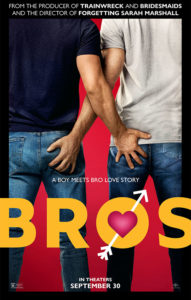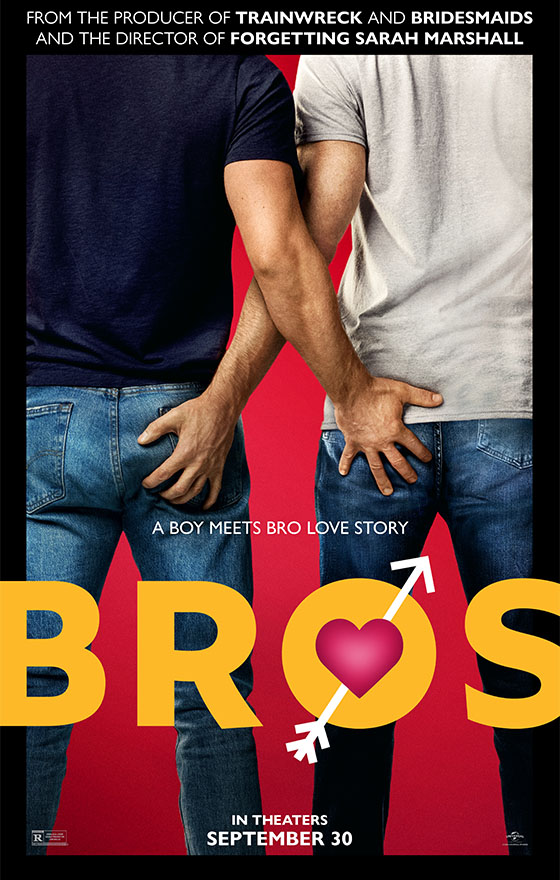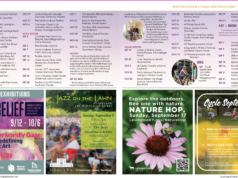Boy Meets Bro
Bros suggests ‘Love isn’t Love’… or does it?
If John Hughes and Nora Ephron had a baby, that baby might have grown up to one day reject Billy Eichner for prom. The success of his new movie Bros, will rise or fall, not based on its much vaunted status as a gay rom-com, but rather on whether or not audiences find his shtick appealing enough to sustain leading man territory. He’s a bit of a polarizing love/hate figure, and far from a household name in middle America… or even midtown.
Co-written and directed by Nicholas Stoller under the Judd-Apatow-Produced banner, a typical Judd Apatow joint relies on his very deep bench of Freaks and Geeks who can sustain even the shaggiest of comedies; his troupe has been working together seamlessly for decades, each bringing their own fan base to every opening weekend box office. The crew here is nascent and untested. The talent is a little thinner, the bench is more shallow, and the writing needed a little more polishing and sharpening. (Carrie Fisher, who was hired to punch up many a Nora Ephron movie, would’ve been the perfect script doctor.) That doesn’t mean Bros isn’t still wildly entertaining. It is.


The story was famously inspired by Tom Hanks’s Oscar acceptance speech for Philadelphia, where he outed his high school drama teacher as a Fine Gay American (with the retiree’s permission).
But in fairness, that was decades ago, and Bros certainly does tread new ground for the well-funded, wildly popular Apatow imprimatur. It’s just a little coy on the PR side for anyone who has a subscription to Showtime or Netflix (see also: Neil Patrick Harris, Uncoupled). It may kick a little dust and gravel off a few bigscreen paths, but it isn’t exactly blazing new trails — good old fashioned PayTV staked this territory decades ago.
Billy on the Street‘s Billy Eichner co-wrote the screenplay for Bros out of a desire to see himself and the LGBT+ community reflected in the type of rom-coms he grew up loving. He wanted his own autumnal New York City montage, dammit! He teamed up with the more experienced Stoller and Apatow, explaining that while they knew movie-making, he could provide insights into contemporary LGBTQ culture, at least from the admittedly old-fashioned privileged white male perspective.
Bros opens with Eichner as Bobby Lieber, setting the stage as a popular podcast host (as is required by law for any movie or tv character created in the last five years). He’s a 40-year-old single gay New Yorker who may not even be looking for love anymore because perhaps he’s just given up. (The argument was always made that the similarly structured Sex and the City was really just a thin veneer of women pasted over four gay stereotypes, and there’s no doubt Bros stands high on its padded 90s shoulders. SATC’s latest incarnation, And Just Like That, has also traded Carrie’s column for Carrie’s podcast.)
His program, The Eleventh Brick (at Stonewall), is an award-winning hit, he has a suitably diverse and loving stable of friends that even includes an affable token straight married couple, and he’s busy curating an LGBTQ+ history museum that is touted as the first of its kind — which it certainly will be if Bobby achieves his dream of an exhibit outing Abraham Lincoln.
Career? Check. Friends? Check. Success? Check. Love? Question mark. Move the action to Minneapolis and he’s practically Mary Richards. Or at least Rhoda.
And that’s the problem. Because Bobby “couldn’t help but wonder”… in the post Obergefell v. Hodges world, was “gay sex more fun when it made straight people uncomfortable?”
Bobby rejects the premise that all storytelling is universal, arguing “love isn’t love,” and he’d prefer it if unenlightened straight people would stop suggesting that it is. Bobby suggests that gay love stories are different, gay dating is different, gay friendships are different, gay sex is different, and he doesn’t want to see the uniqueness co-opted or misappropriated. To demonstrate, these statements are quickly followed by an amusing Grindr exchange, juxtaposed against You’ve Got Mail playing in the background. Well, that settles it! Surely Tom Hanks never had to shave his butt for a prospective internet beau who’s insisting on “an ass pic” (and one can only hope Meg Ryan didn’t either). But, let’s remember that Tom and Meg were on AOL dialup in 1998 and that Tinder had not yet even been invented. God-only-knows how straight people are hooking up online these days, and how unconventional their shenanigans are or are not. The demise of bookstores could still anchor a love story all the way back in 1998. Barnes and Noble was the Big Bad, and Amazon was still a four-year-old toddler. But we’re not in Kansas anymore.
Has all this contemporary grinding made Bobby cynical? Maybe. But then he spots Aaron (Luke Macfarlane), across a very loud launch party for the new Zellweger app and the two strike up a conversation… which Aaron keeps wandering off from, while Bobby repeatedly calls him out on it. Aaron is a textbook 10 while Bobby is a 6 visibly trying his best to claw his way to a 7 while his personality probably hinders more than it helps. When Bobby prods Aaron on the potential pitfalls of an opposites-attract-dynamic, Aaron grows a vocabulary just long enough to grin ironically, that yeah, he wants what any hot guy wants, “someone who’s very physically frail and won’t stop talking” (not that he could define irony, and not that that’s a criticism; remember, he’s a 10.)
(Any straight friend would’ve surely told Bobby “he’s just not that into you,” and responsibly sent him home in a 1990s rom-com-friendly yellow cab.)
Somehow the two fumble their way into a series of dates and it emerges that neither of them is looking for a relationship, but perhaps they “could be emotionally unavailable together” (a fantasy for many gays and straights alike). Their early sex scenes are mostly played for laughs and slapstick (uh, literally), as they typically are in any Judd Apatow vehicle (remember Seth Rogen naked in Knocked Up? Remember Jon Hamm’s ridiculous attempts at over-confident bad sex with Kristen Wiig in the Bridesmaids cold open?)
Aaron turns out to be a testosterone-injecting, Garth Brooks-loving basic Gay Bro who knows a lot more about Friends and The Hangover than Will and Grace. He isn’t front row at Gaga, he unabashedly wants Brad Paisley to get a little mud on his tires. In a page ripped straight from Bridesmaids, he’s just a simple guy who hates his career and secretly wants to run a gourmet small batch artisanal sweet shop where he’ll whip up premium divine confections and glamorous garnishes.
This isn’t a gay vs. straight throughline, so much as it is a NYC/urban vs rural/smalltown/flyover stalemate. When one peripheral upstate rube squeals enthusiastically, “gays are my jam,” viewers know instantly things are not going to turn out well for this girl. And they don’t.
And there’s the rub. The whole “love isn’t love” premise is predicated on little more than a contrarian false flag.
Sorry, Bobby. Shave all the posteriors you want… but this? This IS a universal tale as old as time: the smart, funny dork with glasses always secretly wants to go home with the football captain… and secretly wants to be homecoming queen…. and wants to ride off into the sunset with Heath Ledger. This is Sixteen Candles and Pretty in Pink and by gosh, it IS all just Some Kind of Wonderful. It’s “The Head and the Hair” episode of 30 Rock and Liz Lemon is the ur-prom queen. It’s every single episode of The Mindy Project.
Within those Geek + Hot Guy parameters, naturally Bobby and Aaron struggle. Montages ensue. Overshares exchanged on the beach turn into a Jerry-and-Elaine dance party before morphing into love scenes so tender, it’s Pretty Woman and Chekhov’s Smooch all over again. You know, like when Julia Roberts and Richard Gere finally kiss, and we know it’s LOVE, because we’ve been told in Act I that Prostitutes Do Not Kiss (in rom-com land, such intimacy is reserved for meaningful connections; in real life, presumably, hookers will kiss whatever you ask them to kiss for money). Bobby and Aaron have saved up a gesture that’s a little more … explicit, and one that probably doesn’t appear within most 1st-thru-3rd-base sexual constructs (let’s call it, 4th base, behind the plate)… but they tell/don’t show. While it’s not graphic, it is a touching romantic payoff. (The logistics happen off screen, much as they would in any rom-com.)
Then a Thing Happens. And the two are briefly kept artificially apart via a Typical Cinematic Contrivance, much like Harry and Sally, or Mindy Kaling and almost anybody. Or Carrie Fisher and almost anybody. There’s some miscommunication that suggests Aaron has asked Bobby to be “less than” himself, when all he was really suggesting is that it might be nice if his boyfriend knew how to put on company manners when the in-laws visit — if he could apply a modicum of an Appropriateness Filter.
Because Aaron is right: Bobby/Billy is A Lot. Even Eichner’s most ardent fans would probably admit it wouldn’t hurt him to read the room and dial it down a notch once in awhile if the occasion warrants. No one — least of all Aaron — is trying to shove him back into the closet. He could just ease up on the R-rated rat-a-tat-tat rhetoric when elders and children are present. We all know if Chris Rock Brings the Pain when he shows up for dinner with Lake Bell’s grandma, he’s not going to be invited back. He’s still Chris Rock, even if he respectfully curtails the F-words and P-words in the company of octogenarians. Any thoughtful artist would.
Of course Aaron and Bobby’s relationship is in no real danger as it rolls to its inevitable frothy reunion. What kind of rom-com would have a sad ending? This isn’t Nicholas Sparks for heaven’s sake.
At the end, is Billy right when he posits “Love isn’t love.”?
That’s a matter of opinion, but one thing’s still for sure: “Love IS all around, no need to waste it.”








